COVID-19 updates: Australia may consider Johnson & Johnson’s COVID vaccine
Australia’s medical regulator has indicated it is prepared to consider approving Johnson and Johnson vaccine for local usage.
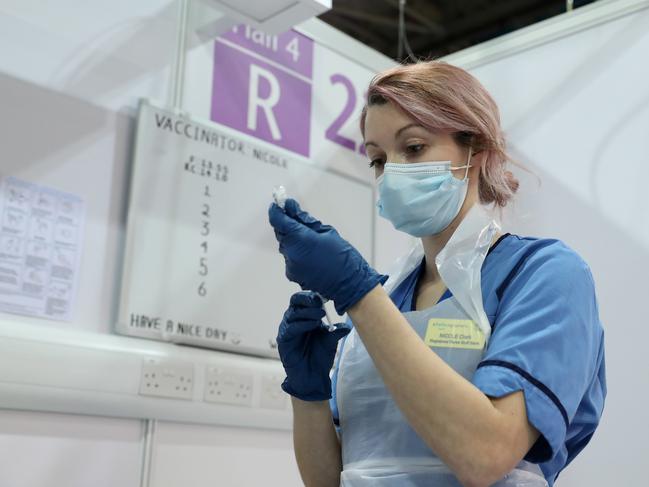
World
Don't miss out on the headlines from World. Followed categories will be added to My News.
Australia’s medical regulator has already indicated it is prepared to consider approving the Johnson and Johnson vaccine for use in Australia.
In November last year it granted the vaccine a provisional determination.
That means the pharmaceutical company can apply to market the vaccine in Australia if it presents evidence of its safety and effectiveness for review by the Therapeutic Goods Administration.
The Australian Government has not yet purchased any of this vaccine for use here and the company is understood to be asking the government to provide a no fault compensation scheme to cover any adverse reactions.
The key advantage of the Johnsons and Johnson vaccine is that it requires just a single shot.
Clinical trials showed the vaccine was 66.9 per cent effective against moderate to severe cases of COVID-19.
The news comes after the US Food and Drug Administration endorsed Johnson & Johnson’s COVID-19 vaccine for emergency use, a critical step in bringing a third shot to the US marketplace.
According to new documents released by the FDA on Wednesday (local time), the single-shot Johnson & Johnson vaccine is highly effective in preventing severe COVID-19, including the South African and Brazil variants, new documents released by the US Food and Drug Administration showed on Wednesday (local time).
In large clinical trials, the vaccine efficacy against severe disease was 85.9 per cent in the United States, 81.7 per cent in South Africa, and 87.6 per cent in Brazil.
An independent panel of the Food and Drug Administration will meet to discuss its merits on Friday and an emergency use authorisation is likely to follow soon after.
That would bring a third vaccine into the fight against the outbreak in the United States, the world’s hardest-hit country where more than 500,000 people have lost their lives.
Experts see the J & J vaccine as a vital tool, even though its efficacy against moderate COVID-19 is lower than that demonstrated by the Pfizer and Moderna shots that have already received authorisation.
“The vaccine was effective in preventing COVID-19 using a less restrictive definition of the disease and for more severe disease, including COVID-19 requiring medical intervention, considering all cases starting 14 days after vaccination,” the new FDA summary said.
“Although a lower efficacy overall was observed in South Africa, where there was a predominance of B.1.3.5 lineage during the time period of this study, vaccine efficacy against severe/critical COVID-19 was similarly high across the United States, South Africa, and Brazil,” it added.
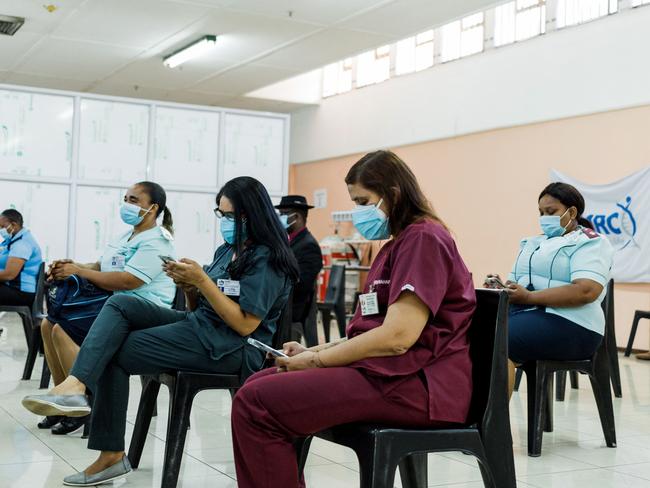
The J & J vaccine uses a common-cold causing adenovirus, which has been modified so that it can’t replicate, to carry the gene for a key protein of the coronavirus into human cells.
This makes those cells produce that protein, which in turn trains the human immune system.
The fact that it requires only one dose, and that it can be stored at fridge temperature rather than in freezers like the Pfizer and Moderna shots, gives it an operational advantage.
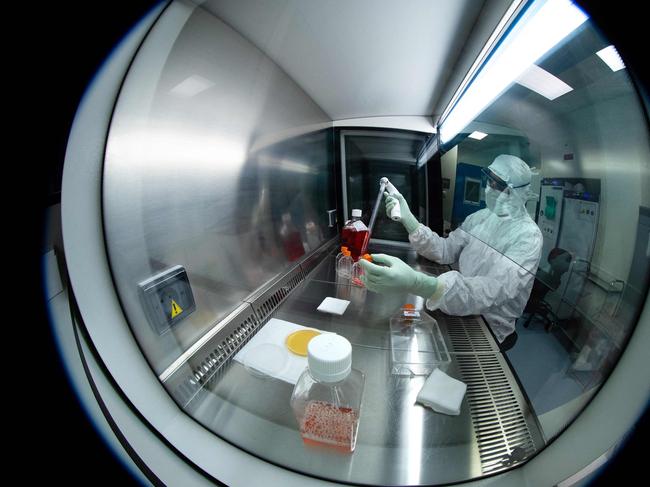
EU PROMISES VACCINE PUSH AS BELGIUM WARNS OF ‘SERIOUS DELAYS’
Meanwhile, European Commission chief Ursula von der Leyen insisted on Wednesday (local time) that problems dogging vaccine supplies to the EU can be resolved, after AstraZeneca said it could deliver only half of its expected amount in the second quarter.
AstraZeneca said on Tuesday it would look to make up the shortfall from supply chains other than those that now serve the 27-nation European Union.
A spokesman for the British-Swedish drugs group told reporters that AstraZeneca was “working to increase productivity in its EU supply chain” and would use its “global capability in order to achieve delivery of 180 million doses to the EU in the second quarter.
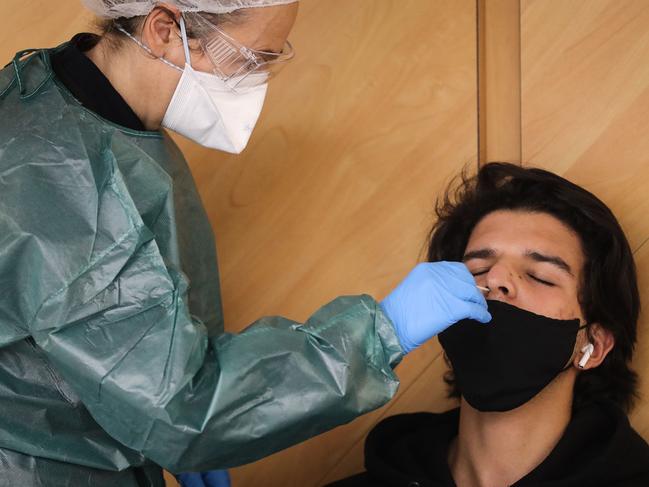
“Approximately half of the expected volume is due to come from the EU supply chain” while the remainder would come from its global supply network, he added.
Shortages of vaccine doses continue to blight national plans across the EU, with Belgium the latest to warn of “serious delays” to its plans, with vaccination of people over 65 postponed to the end of March.
Ahead of a virtual EU summit on the COVID-19 pandemic, Ms von der Leyen sought to calm impatience over the bloc’s stuttering vaccine rollout.
“Vaccine manufacturers are our partners in this pandemic and they have also never faced such a challenge,” she told the German regional daily Augsburger Allgemeine.
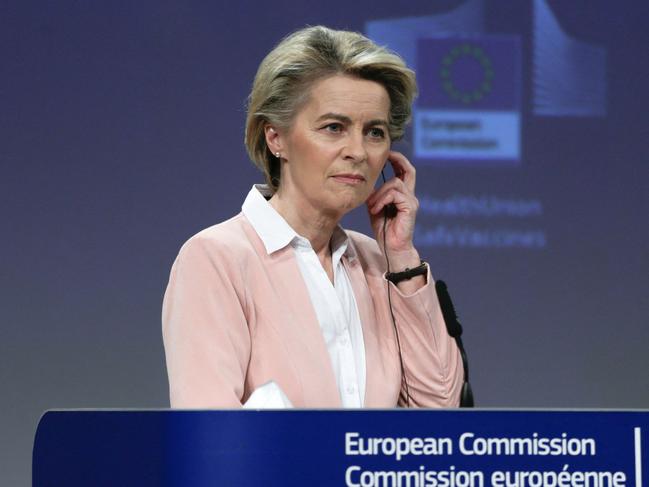
“New questions are always arising that we can generally resolve amicably,” she said, adding that she was “optimistic”.
Ms von der Leyen advocated “working together with the companies to ensure global production is improved”.
The announcement follows controversy over first-quarter deliveries of the AstraZeneca-Oxford University jab to the EU, which has caused tension between the bloc and the pharmaceutical company.
DIPLOMATIC TENSIONS
Before the EU approved the vaccine in late January, the company sparked fury among European leaders by announcing that it would miss its supply target of 400 million doses due to a shortfall at the firm’s European plants.
The disagreement also caused diplomatic tensions with Britain, which definitively left the EU after 40 years of membership — with Brussels implicitly accusing AstraZeneca of giving preferential treatment to Britain at the bloc’s expense.
The UK government has vaccinated millions of Britons with the AstraZeneca jab since late last year.
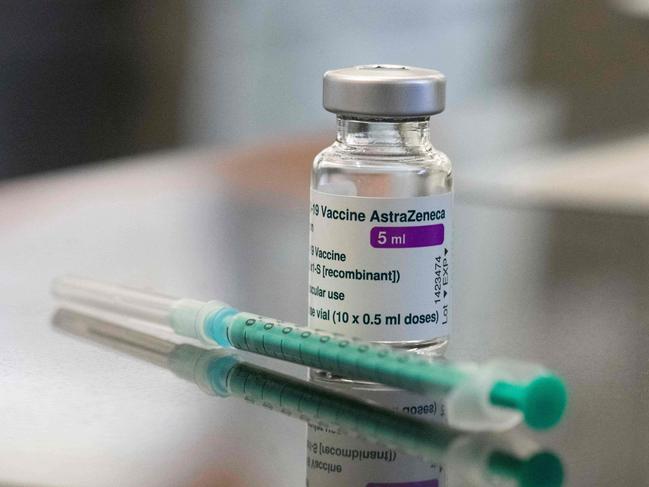
But the company only began shipping it to the EU in early February, after the bloc’s drug regulator took its time issuing a recommendation.
The AstraZeneca vaccine has suffered a number of setbacks — it was temporarily excluded from South Africa’s immunisation campaign because of concern it was less effective against new virus variants there.
Meanwhile Germany’s vaccine commission recommended it only for people aged 18 to 64 years old.
German demand for the jab has been affected as a result. Some 1.4 million doses of AstraZeneca vaccines have been delivered but on Tuesday, official data showed only 239,000 had been administered.
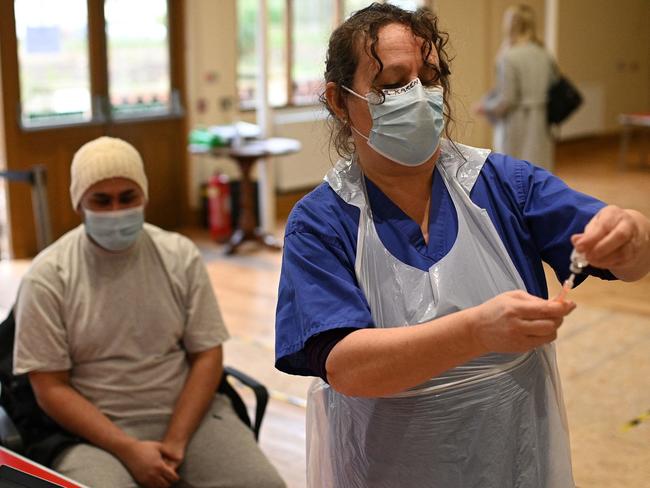
Recently however, World Health Organisation experts recommended it for use with people aged over 65 and in settings where new strains of the virus are circulating.
The shot forms the bulk of doses being rolled out around the world — especially in poorer countries — under the Covax program.
It has drawn praise for its low cost relative to rivals and lighter logistics requirements because it can be stored in a regular refrigerator.
On February 11, AstraZeneca said its annual profit had doubled in 2020.
ITALY TO EXTEND RESTRICTIONS
It comes as Italy faces another month of restrictions due to the threat posed by new strains of the coronavirus, its Health Minister Roberto Speranza said on Wednesday (local time).
The government is expected to adopt a new decree in the coming days, extending a three-tier system of regional restrictions currently set to expire on March 5.
“We are in no epidemiological condition today to relax the measures against the pandemic,” Mr Speranza said, indicating that curbs would be extended until April 6.
“Telling the country the truth is an obligation we must all strongly feel, even when this truth is uncomfortable,” the minister said.
He noted that 25 Italian towns or provinces had recently gone into lockdown due to outbreaks of British, South African or Brazilian strains of the coronavirus.
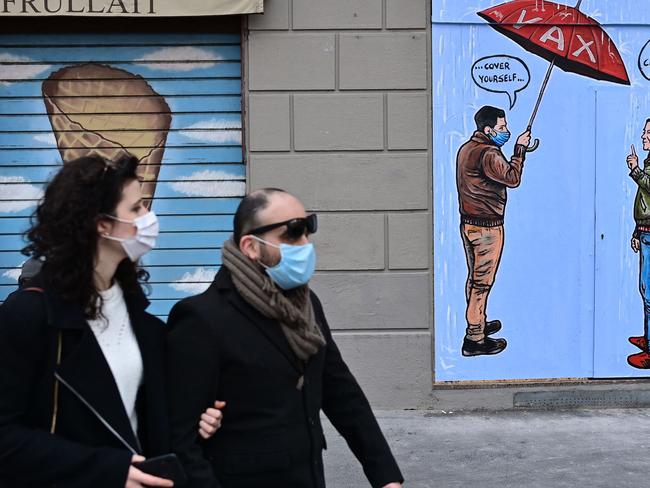
The faster rate of transmission of the new variants “makes it even more essential for the country to raise its guard,” Mr Speranza said.
“It is still possible to contain their spread, as long as very rigorous measures are adopted and quickly enforced,” he added, referring to localised lockdowns.
The situation is particularly critical in the southern Molise region, where the army was due to step in to provide extra intensive care hospital beds.
Italy’s new prime minister, former European Central Bank chief Mario Draghi, has made fighting the pandemic his number one priority.
Italy, the first country in Europe to be struck by the coronavirus pandemic one year ago, has paid a heavy price during the last 12 months.
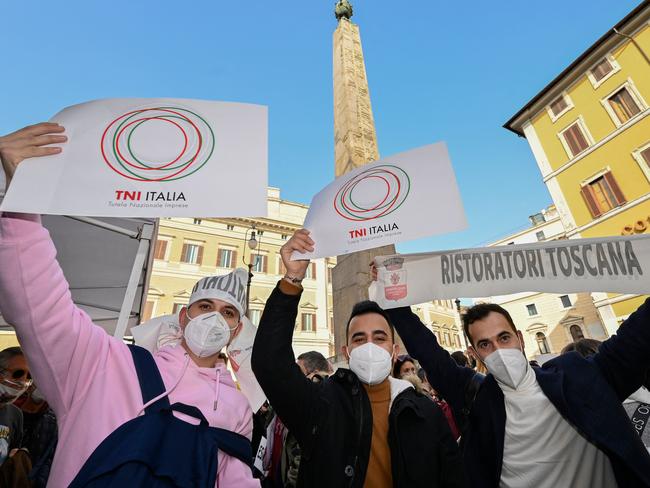
More than 96,000 people with COVID-19 have died, while the economy plunged by nearly nine per cent in 2020, the worst recession since World War II.
Meanwhile, the country’s vaccination campaign has struggled, mostly due to Europe-wide supply problems. Only some 1.3 million people have been fully vaccinated so far.
‘TICKET TO FREEDOM’: AUSSIE MEDICS IN UK PRAISE COVID JAB
Australian medics in the UK have revealed intensive care unit admissions have plummeted since the vaccine rollout.
And cases among frontline staff who were first in line for jabs have dropped significantly, with those who have had the jab telling their friends and family back home to jump at the chance of a vaccination.
The rollout of the Pfizer and Oxford vaccines in Britain has hit more than 16 million people, with plans for up to one million shots a day.
Kathryn Lennon, who works in intensive care at a London hospital, said nurses had previously looked after as many as four patients at a time but it was improving.
“I looked after just one patient last night and that’s the first time I’ve done that since November,” she said.
“The vaccine definitely has something to do with it. I haven’t seen a new case (in ICU) in a while, where we were admitting 10 patients a night – so that meant 10 patients were dying.”
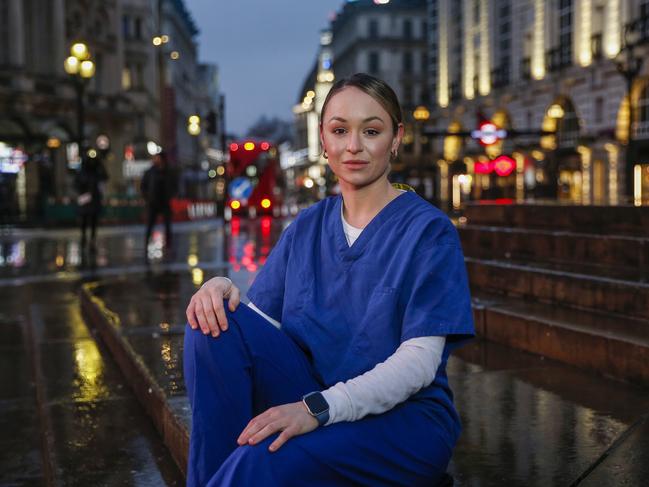
Ms Lennon, 26, of Cairns, said she expected Australians would take the jab once they were offered it, despite reports this week of some concerns.
“They will take it, I know they will, if 15 million people in the UK in the older ages group have taken it, when their time comes (in Australia) they will.
“I was told I could get it at work and I ran down the hallway with excitement.”
Ms Lennon, due to have her second shot next week, said the jabs were life saving and the only way to get back to “some kind of normality.”
“It’s your ticket to freedom,” she said, adding she expected a higher take up in Victoria after its three lockdowns.
Australians have been on the frontline, with 20 per cent of paramedics in London calling Australia home, while nurses, occupational therapists, and doctors from Queensland, New South Wales and Victoria filling key roles.
Some involved in mass vaccination centres say they have personally seen thousands of injections, with only one side effect of dizziness that was related to dehydration.
It is a remarkable change from the depths of winter in December in Britain when official cases were skyrocketing at more than 60,000 a day, but the real number was more than one million when asymptomatic cases were included.
Staff were being forced off sick because of the new more infectious UK variant and the death toll each day was more than 1000.
But now, there is light and hope, as the runaway success of Britain’s vaccination program has seen a dramatic reduction in cases.
“We’ve got a lot of staff back – so many were off with COVID or because they had been in contact with someone with COVID,” occupational therapist Harriet Yeates, 27, said.
“Either the staff have had it or the vaccine is doing its job, the numbers are going down.”
Ambulance call outs, which were topping 9000 a day, have dropped to 5000 a day in London.
And at the peak of the crisis nearly all ambulance call outs were related to COVID, while that has dropped to as little as once a shift.
Ms Yeates, from Townsville, Queensland, said the virus was taking out so many staff in December, before the roll out of the vaccine, compared with the first wave.
“This time it was so much more infectious,” she said.
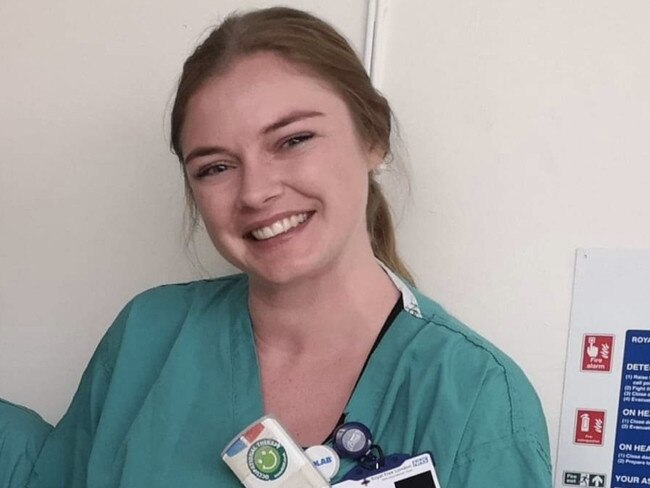
All over 70s have been offered the injection in the UK, now clinically vulnerable people are being sent letters inviting them to take part.
Ms Yeates, who works at the Royal Free Hospital in London, has switched from her OT role to helping in the flow of patients through the hospital.
She has been working to make sure patients that can be discharged so that beds are freed up for more patients, with almost 40,000 in hospitals with COVID at the peak of the crisis.
Some elderly patients had been saying before they took the jab that they had nothing to live for because the harsh lockdowns in the UK had stopped them from seeing their loved ones.
Now they had hope.
Ms Yeates, who had her second dose on January 8, said Australians should get the jab.
“I was one of the first in there. It’s the best thing we have got, we just have to give it a go,” she said.
She understood why some people would be concerned about the speed of the approval of the vaccines, but said that the world’s scientific community had been so focused on the job it fast tracked the process, rather than cutting corners.
Australians have also been at the frontline of the vaccinations program in the UK.
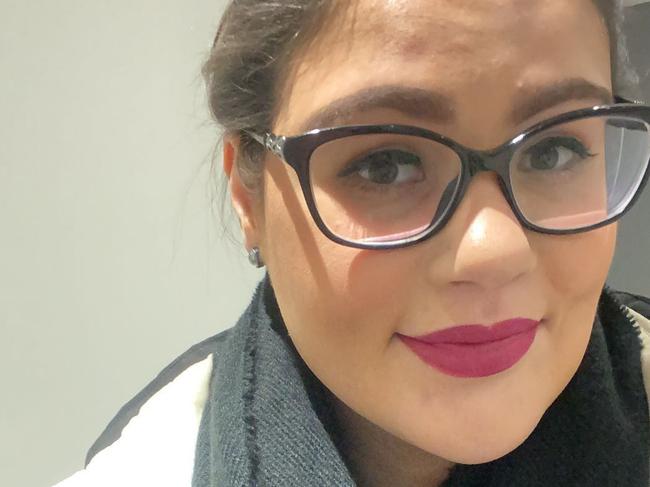
Sabrina Galasso, 27, of Sydney, has been working in a centre that has given out more than 50,000 vaccinations.
The accountant, who retrained to take part in the campaign, said she had seen only one side effect with a patient who became dizzy because they were dehydrated.
The type-1 diabetic, who has had the first dose of the jab, said she had seen first hand the impact of the rollout, with elderly patients grateful for the life saving jabs.
Some of those given the first jab in December had already received a second dose in January.
“We’re now getting people on their second doses and I ask them what their side effects were,” she said.
“Every single patient over 90 has said that they only had a sore arm for a bit, so if a 90-year-old can handle it then everyone just needs to be brave.”
Ms Galasso said she respected that some people may not want the jab, and had even had cases where people changed their mind in the vaccination centre.
But she added that it was the only way out of the pandemic.
She now plans to train to be a nurse when she returns to Australia.
Originally published as COVID-19 updates: Australia may consider Johnson & Johnson’s COVID vaccine


